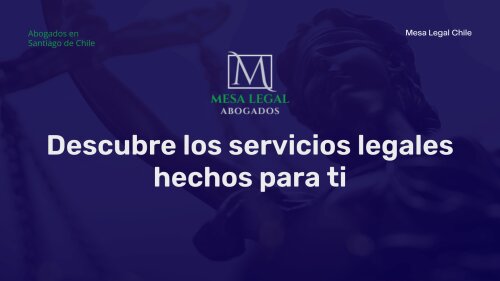Best Probate Lawyers in Santiago
Share your needs with us, get contacted by law firms.
Free. Takes 2 min.
List of the best lawyers in Santiago, Chile
About Probate Law in Santiago, Chile
Probate, known locally as juicio de posesión efectiva, is the legal process that deals with the transfer and management of a deceased person’s assets and obligations. In Santiago, Chile, probate ensures that a deceased person's property, debts, and inheritance rights are distributed according to Chilean laws or the deceased's will if one exists. The process is handled by the local Civil Courts and, in cases of intestate succession (when there is no will), follows legal rules set out in the Chilean Civil Code. The probate process safeguards the interests of heirs, creditors, and beneficiaries while providing official recognition of property transmission.
Why You May Need a Lawyer
Handling probate matters can be complex due to legal procedures and documentation requirements. Many individuals in Santiago may benefit from hiring a lawyer for the following reasons:
- Disputes among heirs or beneficiaries
- Complex or international assets
- Doubts regarding the validity of a will
- Outstanding debts or taxes connected to the estate
- Uncertainties about the probate process itself
- Ensuring legal compliance and timely processing
- Facilitating property transfer and updating public records
A lawyer can guide you through paperwork, court appearances, negotiating with other parties, and overcoming potential obstacles that might arise.
Local Laws Overview
Probate in Santiago, Chile, is regulated primarily by the Chilean Civil Code and supplementary legislation. Noteworthy points include:
- Intestate Succession: If no valid will exists, assets are distributed among heirs defined by law, prioritizing spouses, children, and parents.
- Testate Succession: If there is a valid will, assets are distributed according to its terms, within limits set by forced heirship rules.
- Posesión Efectiva: A formal process required to register the transfer of estate assets, often processed by the Civil Registry when the estate is not contested and by the Civil Court when complications arise.
- Debts and Liabilities: Before heirs may receive assets, debts and obligations of the deceased must be settled.
- Community Property: Special rules apply if the deceased was married under a community property regime.
- Tax Implications: Inheritance tax declarations may be required.
- Foreign Elements: When assets or heirs are located abroad, international law and treaties may also apply.
Frequently Asked Questions
How do I start a probate process in Santiago?
The process starts by obtaining the death certificate and applying for posesión efectiva at the Civil Registry (for intestate succession) or the Civil Court (for testate succession or when disputes arise). You must submit documents proving kinship and any wills if applicable.
What is the difference between testate and intestate succession?
Testate succession occurs when the deceased left a valid will. Intestate succession happens if there is no will or if the will is invalid. Chilean law dictates heirship and distribution in intestate cases.
Who has the right to inherit in Chile?
Spouses, children, and parents have priority. If these individuals are absent, siblings, grandparents, or more distant relatives may inherit according to a preset legal order.
Is it mandatory to hire a lawyer for probate in Santiago?
While not always legally mandatory (particularly for straightforward intestate cases processed via the Civil Registry), having a lawyer is strongly recommended if the estate is contested, contains complex assets, or if you are uncertain about the process.
What documents are required for probate?
Essential documents include the death certificate, proof of relationship (such as birth or marriage certificates), identification of heirs, property records, and any wills. Additional documents may be required for particular assets or circumstances.
How long does the probate process take?
Timelines vary. Simple cases processed through the Civil Registry may take a few weeks to several months. More complex or contested cases handled by the Civil Court may take a year or longer.
What happens to debts of the deceased?
Debts must be paid from the estate before assets are distributed to heirs. Heirs are not personally responsible for debts, but they may receive a reduced inheritance if liabilities exceed assets.
How are foreign assets handled in Chilean probate?
Foreign assets may involve additional steps, including the application of foreign law or treaties, consular procedures, and apostilles or legalizations of documents. Specialized legal guidance is recommended for cross-border estates.
Can a will be contested?
Yes, heirs or interested parties may contest a will on grounds such as lack of capacity, coercion, or formal defects. Such disputes are resolved by the Civil Court in Santiago.
What are forced heirship rules?
Chilean law requires a portion of the estate (known as the legítima) to be reserved for mandatory heirs such as children, spouses, or parents. The testator cannot freely dispose of this portion.
Additional Resources
Several institutions and resources can provide information and support regarding probate in Santiago, Chile:
- Servicio de Registro Civil e Identificación: Handles posesión efectiva procedures for uncontested intestate successions.
- Civil Courts of Santiago: Responsible for probate cases involving disputes, wills, or complex matters.
- Bar Association of Chile (Colegio de Abogados de Chile): Offers lawyer referrals and guidance.
- Ministerio de Justicia y Derechos Humanos: Provides legal information and support for probate matters.
- Nonprofit Legal Aid Services (Corporación de Asistencia Judicial): Offers assistance for those unable to afford private legal representation.
Family members, financial institutions, and notaries can also be helpful in gathering documentation and completing formalities.
Next Steps
If you need legal assistance with probate in Santiago:
- Collect all relevant documents including the death certificate, property records, and proof of relationship.
- Determine if there is a will and locate it if possible.
- Contact the Civil Registry to start formalities for intestate cases, or the Civil Court in case of a will or disputes.
- If the process appears complex or if disputes are likely, consult a lawyer who specializes in probate law.
- If resources are limited, consider seeking help through nonprofit legal services or public institutions.
- Act promptly, as delays can complicate or extend the probate process.
Understanding probate law in Santiago and seeking proper guidance can help protect your rights and ensure a fair and efficient resolution of your loved one’s estate.
Lawzana helps you find the best lawyers and law firms in Santiago through a curated and pre-screened list of qualified legal professionals. Our platform offers rankings and detailed profiles of attorneys and law firms, allowing you to compare based on practice areas, including Probate, experience, and client feedback.
Each profile includes a description of the firm's areas of practice, client reviews, team members and partners, year of establishment, spoken languages, office locations, contact information, social media presence, and any published articles or resources. Most firms on our platform speak English and are experienced in both local and international legal matters.
Get a quote from top-rated law firms in Santiago, Chile — quickly, securely, and without unnecessary hassle.
Disclaimer:
The information provided on this page is for general informational purposes only and does not constitute legal advice. While we strive to ensure the accuracy and relevance of the content, legal information may change over time, and interpretations of the law can vary. You should always consult with a qualified legal professional for advice specific to your situation.
We disclaim all liability for actions taken or not taken based on the content of this page. If you believe any information is incorrect or outdated, please contact us, and we will review and update it where appropriate.









